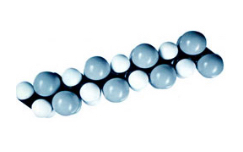Teflon® industrial coatings can be sprayed like paints to create a durable and chemically stable coating after baking. Through years of improvement, various types of household coatings have been developed to ensure that the coating has multiple properties to meet the majority of cooking requirements. Due to the heat resistance, comprehensive chemical stability, excellent insulation stability, and low friction coefficient, Teflon® industrial coatings can serve as a solution that cannot be matched by any other material.
Frequently asked questions

PTFE (Polytetrafluoroethylene) non-stick coatings are a system with two-layer coatings (primer and topcoat). These products have the highest operating temperature (290°C/550°F), an extremely low coefficient of friction, excellent wear resistance, and outstanding chemical stability, compared to any fluoropolymers.

FEP (Fluorinated Ethylene Propylene Copolymer) non-stick coatings melt and flow during baking to provide nonporous films. The coatings have excellent chemical stability. In addition to low friction, FEP coatings also have excellent non-stick properties. The maximum operating temperature is 205°C/400°F.

Similar to FEP, PFA (perfluoroalkoxy) non-stick coatings melt and flow during baking to provide nonporous films. In comparison to FEP, PFA holds the advantage of a higher continuous use temperature (260°C/500°F) and a coating thickness of up to 1000 micrometers (40 mils), making it the optimal choice for various applications, especially in chemical-resistant fields.

ETFE is a copolymer of ethylene and tetrafluoroethylene. Although not fully fluorinated, ETFE, with excellent chemical resistance, can be used continuously at 150°C/300°F. This resin is the toughest fluoropolymer, with a coating thickness of up to 1000 micrometers (40 mils) to form a highly durable coating.

Very few solid substances will permanently adhere to Teflon® coatings. Although tacky materials may show some adhesion, almost all substance release easily.
The coefficient of friction of Teflon® is generally in the range of 0.05 to 0.20, depending on the load, sliding speed and particular Teflon® coating used.
Teflon® industrial coating can operate continuously at temperatures 290°C/550°F and intermitently up to 315°C /600°F with adequate ventilation.
Teflon® is normally unaffected by chemical environments. The only chemicals that may have a negative effect are molten alkali metals and highly reactive fluorinating agents.
Since surfaces coated with Teflon® are both oleophobic and hydrophobic, they are not readily wetted. Cleanup is easier and more thorough – in many cases, surfaces are self-cleaning.
Many Teflon® industrial coating withstands severe temperature extremes without loss of physical properties. Teflon® industrial coating may used at temperatures as low as 270°C/-454°F.
Over a wide range of frequencies, Teflon® has high dielectric strength, low dissipation factor, and very high surface resistively. Through special formulations or industrial treatment, it can even exhibit certain conductivity and be used as an anti-static coating.
The food industry often encounters situations where a certain area has been heated up to standard, but other areas have not been fully heated, resulting in longer cooking times. Combining the existing properties of Teflon®, with further research and development, Teflon® can now control the speed of heat conduction.